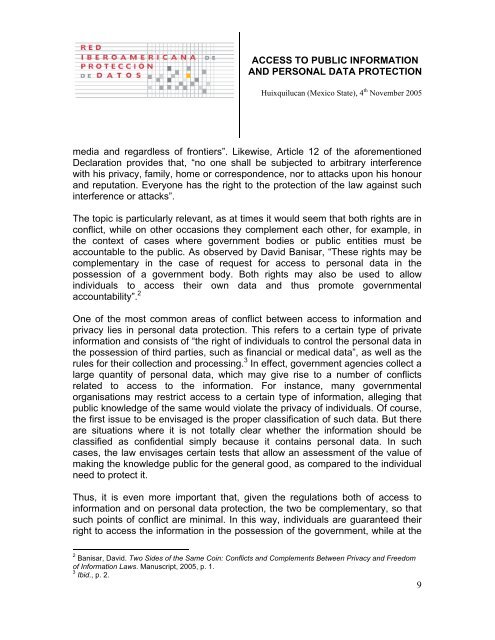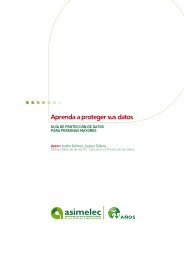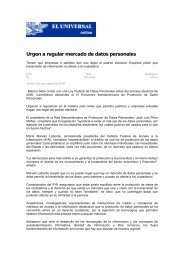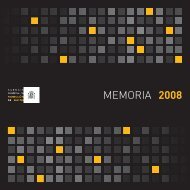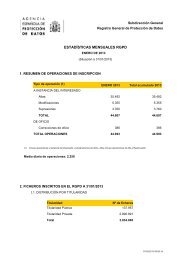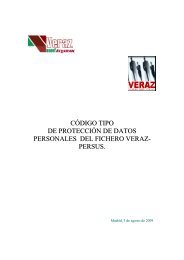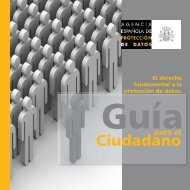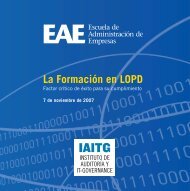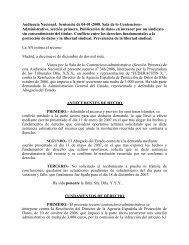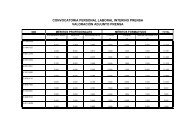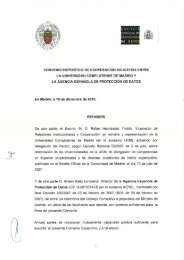access to public information and personal data protection 1 table of ...
access to public information and personal data protection 1 table of ...
access to public information and personal data protection 1 table of ...
You also want an ePaper? Increase the reach of your titles
YUMPU automatically turns print PDFs into web optimized ePapers that Google loves.
ACCESS TO PUBLIC INFORMATIONAND PERSONAL DATA PROTECTIONHuixquilucan (Mexico State), 4 th November 2005media <strong>and</strong> regardless <strong>of</strong> frontiers”. Likewise, Article 12 <strong>of</strong> the aforementionedDeclaration provides that, “no one shall be subjected <strong>to</strong> arbitrary interferencewith his privacy, family, home or correspondence, nor <strong>to</strong> attacks upon his honour<strong>and</strong> reputation. Everyone has the right <strong>to</strong> the <strong>protection</strong> <strong>of</strong> the law against suchinterference or attacks”.The <strong>to</strong>pic is particularly relevant, as at times it would seem that both rights are inconflict, while on other occasions they complement each other, for example, inthe context <strong>of</strong> cases where government bodies or <strong>public</strong> entities must beaccoun<strong>table</strong> <strong>to</strong> the <strong>public</strong>. As observed by David Banisar, “These rights may becomplementary in the case <strong>of</strong> request for <strong>access</strong> <strong>to</strong> <strong>personal</strong> <strong>data</strong> in thepossession <strong>of</strong> a government body. Both rights may also be used <strong>to</strong> allowindividuals <strong>to</strong> <strong>access</strong> their own <strong>data</strong> <strong>and</strong> thus promote governmentalaccountability”. 2One <strong>of</strong> the most common areas <strong>of</strong> conflict between <strong>access</strong> <strong>to</strong> <strong>information</strong> <strong>and</strong>privacy lies in <strong>personal</strong> <strong>data</strong> <strong>protection</strong>. This refers <strong>to</strong> a certain type <strong>of</strong> private<strong>information</strong> <strong>and</strong> consists <strong>of</strong> “the right <strong>of</strong> individuals <strong>to</strong> control the <strong>personal</strong> <strong>data</strong> inthe possession <strong>of</strong> third parties, such as financial or medical <strong>data</strong>”, as well as therules for their collection <strong>and</strong> processing. 3 In effect, government agencies collect alarge quantity <strong>of</strong> <strong>personal</strong> <strong>data</strong>, which may give rise <strong>to</strong> a number <strong>of</strong> conflictsrelated <strong>to</strong> <strong>access</strong> <strong>to</strong> the <strong>information</strong>. For instance, many governmentalorganisations may restrict <strong>access</strong> <strong>to</strong> a certain type <strong>of</strong> <strong>information</strong>, alleging that<strong>public</strong> knowledge <strong>of</strong> the same would violate the privacy <strong>of</strong> individuals. Of course,the first issue <strong>to</strong> be envisaged is the proper classification <strong>of</strong> such <strong>data</strong>. But thereare situations where it is not <strong>to</strong>tally clear whether the <strong>information</strong> should beclassified as confidential simply because it contains <strong>personal</strong> <strong>data</strong>. In suchcases, the law envisages certain tests that allow an assessment <strong>of</strong> the value <strong>of</strong>making the knowledge <strong>public</strong> for the general good, as compared <strong>to</strong> the individualneed <strong>to</strong> protect it.Thus, it is even more important that, given the regulations both <strong>of</strong> <strong>access</strong> <strong>to</strong><strong>information</strong> <strong>and</strong> on <strong>personal</strong> <strong>data</strong> <strong>protection</strong>, the two be complementary, so thatsuch points <strong>of</strong> conflict are minimal. In this way, individuals are guaranteed theirright <strong>to</strong> <strong>access</strong> the <strong>information</strong> in the possession <strong>of</strong> the government, while at the2 Banisar, David. Two Sides <strong>of</strong> the Same Coin: Conflicts <strong>and</strong> Complements Between Privacy <strong>and</strong> Freedom<strong>of</strong> Information Laws. Manuscript, 2005, p. 1.3 Ibid., p. 2.9


